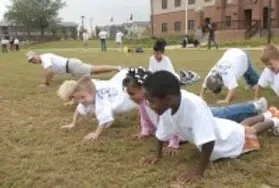A Little Bit More – 21 Push-Ups
“Great men can’t be ruled.”
Shortly into my teaching career, I learned that there are three kinds of students:
Group One: Those who do it when it’s required.
Group Two: Those who don’t do it when it’s required.
Group Three: Those who do it even when it’s not required.
Most students are in the first group. When an assignment is mandatory, they’ll do it. Disappointingly, there are usually a few who fall into the second group. They’re the kids who are habitually “looking for easy,” often getting into trouble and doing as little as possible. Thankfully, there are students who fall into the third group. The volunteers. The kids who do extra. The ones who exceed expectations.
The adult world is no different. There are three kinds of people:
Group One: Those who do it when it’s required. (most people)
Group Two: Those who don’t do it when it’s required. (inmates)
Group Three: Those who do it even when it’s not required. They’re the kind of people we desperately need. The kind of “great men” Rand was talking about. The kind of people who, to quote Bob Marley, “light up the darkness.”
Required is not quite accurate. Nothing is really required. But actions have consequences. Required means that if you don’t do it, there will be a negative consequence. A bad grade. Grounding. A fine. Prison.
It is the thing you should do – the thing you know in your heart is the right thing to do. It is working out when no one is forcing you to. It is picking up trash, even when it’s not your trash. It is volunteering to work with the kid nobody wants to work with. It is coming in early and staying late. It is being the initiator. Or, what Rand, in The Fountainhead, called, the “creator.” It is raising your hand. It is extra credit.
Most people don’t even do what’s expected. So when students do even a little more than what they’re asked, they’re part of a sweet minority. That’s the sad/happy truth (depending upon your point of view). When dealing with the masses, the competition isn’t that tough. Just do what’s required, and you’ll stand out. And if you do a little bit more than required, you’ll shock people.
If I assign a two-page paper, the group-one students will grudgingly do it, yet do everything they creatively can to make it look like they wrote two pages without actually writing two pages. They’ll use large font, skip lines, write big titles, make their margins a shade wider than they should be… you name it, teachers have seen it.
If group-two students write anything at all, it won’t be close to two pages. If I get more than a half page from one of them, I’m secretly thinking win.
Group-three students – maybe one or two in a class of thirty – will write a genuine two-page paper and maybe even a quarter-page extra.
When I taught martial arts, I’d order my students to, “On your own count, drop and give me 20 (push-ups).” I knew that without me closely watching them, most wouldn’t do 20 push-ups. They’d do 17, 18, maybe 19. After the first student stopped, no matter how many he or she did, the others would also stop. Then I’d give them the talk. “Raise your hand if you’ll swear on your best friend’s life that you honestly did 20 push-ups.”
When asked to be, most kids will be truthful, and nearly all of my martial artists would admit that that they hadn’t done 20 push-ups. Most hadn’t even bothered to count. So after teaching them about the three kinds of students (and adults), I’d teach them the 21 Push-ups rule:
“When someone asks you to do something, get into the habit of doing more, even if it’s only a tiny bit more. If I ask you to do 20 push-ups, from now on that means 21. When average people are asked to do 20 of something, how many will even think about doing 21? Doing more than what’s asked is just not in their thought process. Average people don’t think, Do more. They’re thinking, How can I get away with doing less? But you don’t have to be average.”
Not that the longer a paper is, the better it is. Not that the more you do, the better it will be. Quantity doesn’t equal quality. But 21 Push-ups is easily understood by kids and clearly makes the point that it doesn’t take an absurd amount of effort to be extraordinary. It just takes a little bit more – like that 21st push-up.


